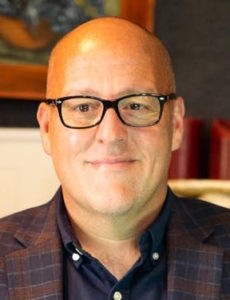A bedrock theological concept of my formation as a white American evangelical was the idea, best articulated by Paul in Romans 14-20, that there is a war going on within all of us between those things that are good and that we want to embrace but don’t, and those things that aren’t good that we don’t want to embrace, but always seem to find a way to embrace. Or, to borrow words from a more recent evangelical prophet, Rich Mullins, in his song Hold Me Jesus: “Surrender don’t come natural to me. I’d rather fight you for something I don’t really want than to take what you give that I need.”

Craig Nash
I’ve reflected on this concept lately as I observe the battles over Critical Race Theory, a framework that argues racism is structurally embedded within our institutions, policies and deeply held myths. There is a movement among policymakers, religious leaders and talking heads to ban the teaching of Critical Race Theory in schools, as the concept has become the latest bogeyman in the culture wars.
This is all confusing to me, because Critical Race Theory gives us “nice white people” everything we’ve ever wanted with regard to fighting racism. Almost.
I grew up in rural East Texas, the most culturally Southern region of the state, in the 1980s and ’90s. By the time I entered public schools, an entire generation of students had experienced integration, and the process of desegregation through “white flight” and the creation of new private schools was only just beginning in more populous areas like Tyler and Longview. Although still predominantly white, the racial makeup of my school and the circles I ran in looked, more or less, like the demographics of my town. This set the backdrop by which I, and many of my friends, tried to make sense of a world where what we understood as “racism” existed in the past, albeit in the recent past of our parents’ and grandparents’ worlds.
“We aren’t racist,” we argued, “we love everyone.” Our mission was not to be the bad guys.
In the church, we made sense of this world in a couple of ways. First, our definition of “racism” allowed for two types of people: Bad Racists and Good Non-Racists. We knew Jesus wanted Christians to be the “good people,” and so that is what we endeavored to be. “We aren’t racist,” we argued, “we love everyone.” Our mission was not to be the bad guys.
Second, assuming that “racism” was mostly over, or at least in its final throes of death, we sought to finish the job by being people of action. When a person of color told stories of being marginalized, our response wasn’t to sit with them in their pain and hear what they were really saying, but rather to fix the situation: “OK, well what do you want me to do?” Of course, we already had the answer to our own question in our mind. We would just be nicer and encourage others to be nicer, and then that would fix things.
Fixing things and being nice. Being nice and fixing things. It was our battle cry.
Which is why the visceral reaction of nice white people against Critical Race Theory is so perplexing. Critical Race Theory argues that being a good or bad person is really kind of irrelevant in the fight against racism.
Black people are incarcerated at much higher rates than white people for the same crimes whether I’m a nice white person or a hateful white person.
I think I’m a nice person, but my niceness did nothing to eliminate the conditions by which Hispanic Americans were twice as likely to be infected and three times as likely to be hospitalized with COVID-19.
My relative niceness or meanness doesn’t change wealth gaps that are the result of years of redlining, mental health struggles among indigenous people caused by generations of forced displacement, or the fact Kyle Rittenhouse could walk right by officers holding the weapon he had just used to kill two people while Tamir Rice lay in a grave for playing with a toy gun.
Of course it is usually better to “be nice,” and to “love everybody” and can make fighting racism easier. While Critical Race Theory doesn’t guarantee that we will be seen as the nice people, it sets us free from the burden of needing to be. And here’s why: It gives us the second thing we’ve always wanted — something to do.
If racism isn’t simply hating someone of another race, but rather a complex system of structures, national myths and policies that serve to benefit one group at the expense of others, as Critical Race Theory posits, then this is good news for us nice white people, because in listening to the voices and following the leadership of those for whom racism most effects it gives us a job to do: Dismantle the structures. Expose the myths. Change the policies. It’s not an easy job, but it is a simple one.
If we are really committed to being “good people” and want to take concrete action to repair the damage done by racism, then why are so many among us so committed to eliminating a framework of understanding that makes those things possible?
“Critical Race Theory gives nice white people everything we’ve ever wanted, except for the one thing we hold on to most tightly: Control.”
I think it is because Critical Race Theory gives nice white people everything we’ve ever wanted, except for the one thing we hold on to most tightly: Control. When describing racism as being about structures, myths and institutions instead of about personal feelings toward someone with different skin tones, the common response from many white people is, “Wait, you don’t get to just redefine racism!” It seems like a valid response, but the subtext is really, “We’ve already defined what racism is, and it has worked just fine for us up to this point.”
It turns out that defining racism as a personal disposition was by design. At the very least, the perpetuation of this common definition serves a purpose, which is to absolve us white people of guilt. If we get to define the terms and frame the conversation, then we get to be the good guys, because we get to define what is good, and the ones who determine how the scourge of racism gets fixed. We get to have the power, which is exactly what Critical Race Theory exposes.
To use a common phrase from my rural East Texas Baptist upbringing, it’s time for us to stop “white-knuckling the pews” and let go. We were told by the evangelists to surrender our control, and that what we give up when we walk down the aisle pales in comparison to what we gain. I think that may be true on both an earthly level as well as an eternal one. A more Christ-honoring world is possible when we lay our power, including the power to define and frame conversations, down on the altar.
Craig Nash lives in Waco, Texas, and works for the Baylor Collaborative on Hunger and Poverty. He is a graduate of East Texas Baptist University and Baylor’s George W. Truett Theological Seminary. He is active in the life of University Baptist Church in Waco.
Related articles:
Editing our narratives has the power to heal future generations | Opinion by Mark Wingfield
It’s not just the SBC banning Critical Race Theory; now state legislatures are joining the fight
Could you win a quiz show by defining ‘Critical Race Theory’?


